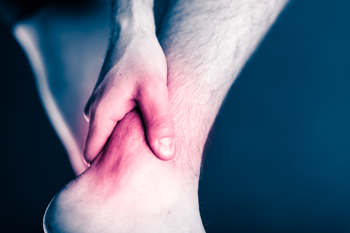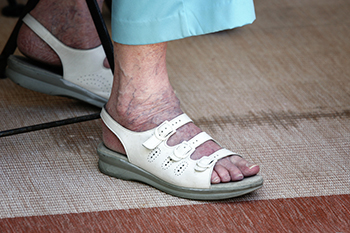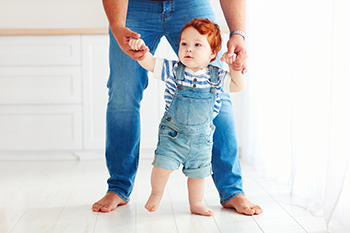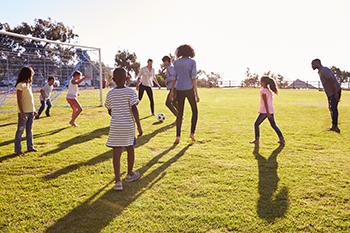Connect With Us
Blog
Items filtered by date: June 2024
Treatment Options for an Achilles Tendon Tear

An Achilles tendon tear, whether partial or complete, is a serious injury often caused by sudden, forceful movements during sports or activities. Symptoms of an Achilles tendon tear include sharp pain, swelling, bruising, and difficulty pointing the foot or standing on tiptoe. Treatment options vary depending on the severity of the tear. Partial tears can often be managed conservatively with immobilization using a cast, splint, brace, or walking boot. This is followed by a structured rehabilitation program to restore strength and flexibility gradually. Complete tears typically require surgical intervention to reattach the tendon ends and ensure optimal healing. Following surgery, a thorough rehabilitation plan is essential to regain full function and reduce the risk of re-injury. If you suspect an Achilles tendon tear or experience symptoms like sudden pain and restricted movement, it is suggested that you seek an appointment with a podiatrist for a full exam and tailored treatment plan.
Achilles tendon injuries need immediate attention to avoid future complications. If you have any concerns, contact one of our podiatrists of Comprehensive Foot & Ankle Centers. Our doctors can provide the care you need to keep you pain-free and on your feet.
What Is the Achilles Tendon?
The Achilles tendon is a tendon that connects the lower leg muscles and calf to the heel of the foot. It is the strongest tendon in the human body and is essential for making movement possible. Because this tendon is such an integral part of the body, any injuries to it can create immense difficulties and should immediately be presented to a doctor.
What Are the Symptoms of an Achilles Tendon Injury?
There are various types of injuries that can affect the Achilles tendon. The two most common injuries are Achilles tendinitis and ruptures of the tendon.
Achilles Tendinitis Symptoms
- Inflammation
- Dull to severe pain
- Increased blood flow to the tendon
- Thickening of the tendon
Rupture Symptoms
- Extreme pain and swelling in the foot
- Total immobility
Treatment and Prevention
Achilles tendon injuries are diagnosed by a thorough physical evaluation, which can include an MRI. Treatment involves rest, physical therapy, and in some cases, surgery. However, various preventative measures can be taken to avoid these injuries, such as:
- Thorough stretching of the tendon before and after exercise
- Strengthening exercises like calf raises, squats, leg curls, leg extensions, leg raises, lunges, and leg presses
If you have any questions please feel free to contact our offices located in Shepherdsville and Louisville, KY . We offer the newest diagnostic tools and technology to treat your foot and ankle needs.
Aging and the Feet
 As the aging population continues to grow, the need for specialized podiatric services in geriatrics is becoming increasingly critical. Older adults often face numerous foot and ankle issues due to years of wear and tear, decreased mobility, and chronic conditions like diabetes, arthritis, and circulatory problems. These issues can significantly impact their quality of life, leading to pain, decreased mobility, and a higher risk of falls and related injuries. Podiatric care is essential for the elderly to maintain their independence and mobility. Regular foot examinations can help prevent and manage conditions, such as bunions, corns, calluses, fungal infections, and foot ulcers. Proper foot care also aids in the early detection and treatment of serious complications such as peripheral neuropathy and poor circulation, which are common in older adults with diabetes. Preventative measures, routine care, and wearing appropriate footwear are vital components of geriatric podiatry services. If you are a senior, it is suggested that you schedule an appointment with a podiatrist for comprehensive foot health management, and to address any specific concerns you may have about your feet or ankles.
As the aging population continues to grow, the need for specialized podiatric services in geriatrics is becoming increasingly critical. Older adults often face numerous foot and ankle issues due to years of wear and tear, decreased mobility, and chronic conditions like diabetes, arthritis, and circulatory problems. These issues can significantly impact their quality of life, leading to pain, decreased mobility, and a higher risk of falls and related injuries. Podiatric care is essential for the elderly to maintain their independence and mobility. Regular foot examinations can help prevent and manage conditions, such as bunions, corns, calluses, fungal infections, and foot ulcers. Proper foot care also aids in the early detection and treatment of serious complications such as peripheral neuropathy and poor circulation, which are common in older adults with diabetes. Preventative measures, routine care, and wearing appropriate footwear are vital components of geriatric podiatry services. If you are a senior, it is suggested that you schedule an appointment with a podiatrist for comprehensive foot health management, and to address any specific concerns you may have about your feet or ankles.
If you need your feet checked, contact one of our podiatrists of Comprehensive Foot & Ankle Centers. Our doctors will attend to all of your foot and ankle needs and provide you with quality treatment.
Geriatrics and Podiatry
When people age, some common issues that may occur are bone density loss, dry skin, poor circulation, and rough brittle nails. These issues may also affect your foot health if the necessary steps are not taken to alleviate the problems.
It is important to take care of your feet because feet that are injured or diseased can affect your overall health. Having painful feet hinders your ability to do daily activities or may decrease your willingness to do the things that you need to do.
Visiting Your Geriatrician
As we age, health problems become more likely, so it is essential to visit your doctor for check-ups to ensure that you are doing the best you can to take care of your health. It is recommended to check your feet frequently for any possible cuts, bruises, swelling, corns or any other irregularities.
Taking Care of Elderly Feet
Cracked or dry feet can be treated by applying moisturizer often. It is also important not to wear old socks because the older the sock is, the higher the possibility there will be that there is bacteria there. Wear fresh socks and make sure they fit properly.
Proper foot health means that you can have a more active lifestyle and you will not be bogged down by pain. Foot health also leads to good circulation, which is paramount for overall health.
If you have any questions, please feel free to contact our offices located in Shepherdsville and Louisville, KY . We offer the newest diagnostic tools and technology to treat your foot and ankle needs.
Reminder: When Was the Last Time...?
Fall Prevention Tips for Babies and Children

As babies and children explore their surroundings, falls are an inevitable part of their journey to independence. However, implementing precautionary measures can significantly reduce the risk of accidents and injuries. Start by creating a safe environment with secured gates at staircases and window guards to prevent falls from elevated surfaces. Ensure furniture is anchored to the wall to prevent tipping and keep floors clutter-free to minimize tripping hazards. When it comes to infants, always supervise them during diaper changes and avoid leaving them unattended on elevated surfaces such as changing tables or sofas. For toddlers and older children, teach them the importance of using handrails when climbing stairs and encourage safe play practices, such as not running indoors or jumping from high places. Additionally, provide age-appropriate toys and equipment and supervise them during activities such as climbing, swinging, or riding bikes. Many children’s feet can be affected from falling, which can hinder enjoying daily activities. If your child has fallen and has foot pain, it is suggested that you consult a podiatrist who can offer treatment solutions, and guide you on more effective fall prevention techniques for your children.
Preventing falls among the elderly is very important. If you are older and have fallen or fear that you are prone to falling, consult with one of our podiatrists from Comprehensive Foot & Ankle Centers. Our doctors will assess your condition and provide you with quality advice and care.
Every 11 seconds, an elderly American is being treated in an emergency room for a fall related injury. Falls are the leading cause of head and hip injuries for those 65 and older. Due to decreases in strength, balance, senses, and lack of awareness, elderly persons are very susceptible to falling. Thankfully, there are a number of things older persons can do to prevent falls.
How to Prevent Falls
Some effective methods that older persons can do to prevent falls include:
- Enrolling in strength and balance exercise program to increase balance and strength
- Periodically having your sight and hearing checked
- Discuss any medications you have with a doctor to see if it increases the risk of falling
- Clearing the house of falling hazards and installing devices like grab bars and railings
- Utilizing a walker or cane
- Wearing shoes that provide good support and cushioning
- Talking to family members about falling and increasing awareness
Falling can be a traumatic and embarrassing experience for elderly persons; this can make them less willing to leave the house, and less willing to talk to someone about their fears of falling. Doing such things, however, will increase the likelihood of tripping or losing one’s balance. Knowing the causes of falling and how to prevent them is the best way to mitigate the risk of serious injury.
If you have any questions, please feel free to contact our offices located in Shepherdsville and Louisville, KY . We offer the newest diagnostic and treatment technologies for all your foot care needs.
Common Foot Injuries Among Active Children

Foot and ankle injuries have become increasingly prevalent in highly active children, posing significant challenges to their athletic pursuits. With a growing number of youngsters participating in organized sports, the incidence of both acute and overuse injuries has surged. These injuries often stem from the rigorous demands of training routines, with many young athletes engaging in multiple sports and activities throughout the week. Overuse injuries arise from the repetitive strain placed on the child’s musculoskeletal system without sufficient rest. This is especially true during periods of heightened training intensity like the beginning of a new season, tournaments, or sports camps. Biomechanical factors such as flat feet, limb length discrepancies, and improper footwear can further increase the risk of injury. Child athletes are particularly susceptible to injuries at tendon attachment sites, joint surfaces, and growth plates. Conditions like Sever’s disease and stress fractures are common. These conditions necessitate prompt diagnosis and tailored treatment plans from a foot doctor. If your active child experiences heel pain, foot swelling, or discomfort while wearing shoes, it is suggested that you schedule an appointment with a podiatrist.
Making sure that your children maintain good foot health is very important as they grow. If you have any questions, contact one of our podiatrists of Comprehensive Foot & Ankle Centers. Our doctors can provide the care you need to keep you pain-free and on your feet.
Keeping Children's Feet Healthy
Having healthy feet during childhood can help prevent medical problems later in life, namely in the back and legs. As children grow, their feet require different types of care. Here are some things to consider...
Although babies do not walk yet, it is still very important to take care of their feet.
Avoid putting tight shoes or socks on his or her feet.
Allow the baby to stretch and kick his or her feet to feel comfortable.
As a toddler, kids are now on the move and begin to develop differently. At this age, toddlers are getting a feel for walking, so don’t be alarmed if your toddler is unsteady or ‘walks funny’.
As your child gets older, it is important to teach them how to take care of their feet.
Show them proper hygiene to prevent infections such as fungus.
Be watchful for any pain or injury.
Have all injuries checked by a doctor as soon as possible.
Comfortable, protective shoes should always be worn, especially at play.
If you have any questions please feel free to contact our offices located in Shepherdsville and Louisville, KY . We offer the newest diagnostic and treatment technologies for all your foot and ankle needs.
Blog Archives
- March 2025
- February 2025
- January 2025
- December 2024
- November 2024
- October 2024
- September 2024
- August 2024
- July 2024
- June 2024
- May 2024
- April 2024
- March 2024
- February 2024
- January 2024
- December 2023
- November 2023
- October 2023
- September 2023
- August 2023
- July 2023
- June 2023
- May 2023
- April 2023
- March 2023
- February 2023
- January 2023
- December 2022
- November 2022
- October 2022
- September 2022
- August 2022
- July 2022
- June 2022
- May 2022
- April 2022
- March 2022
- February 2022
- January 2022
- December 2021
- November 2021
- October 2021
- September 2021
- August 2021
- July 2021
- June 2021
- May 2021
- April 2021
- March 2021
- February 2021
- January 2021
- December 2020

